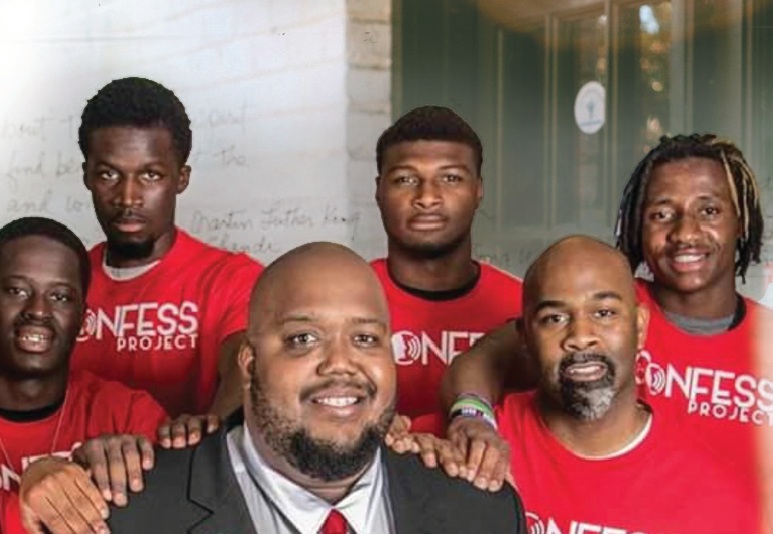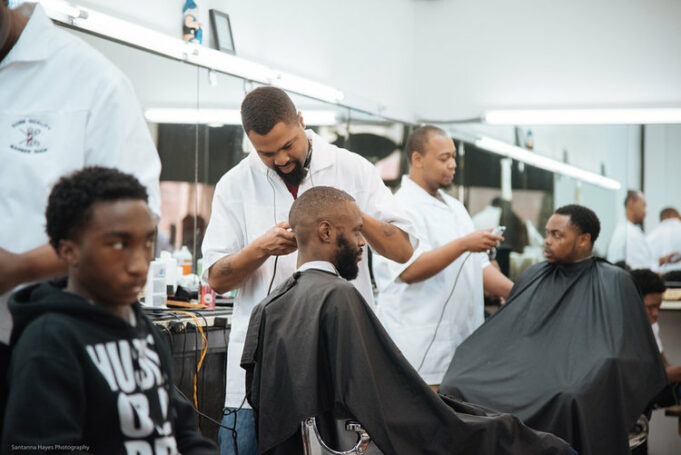Barbershops have always been a cornerstone in Black communities not only as a place for a shave and haircut, but now as a mental health safe space.
Lorenzo Lewis, mental health advocate, coach, speaker and co-founder of the Confess Project, said many Black men and boys see their barber more than their doctor. “The people that we want to come to save the day possibly won’t do it, it’s going to have to be us,” he told The Final Call.
This is how the Confess Project, America’s first national mental health barbershop movement came about. It was born May 2016 in Little Rock, Arkansas, and has been expanding ever since.
“That’s why we put barbers in a position to be advocates—not experts though, they’re not people diagnosing people, they’re not giving medication—they’re advocates, they’re listeners, they’re showing empathy, they’re showing support, they’re giving love, and that will help to cultivate that person whether they want to get therapy, whether they want to reanalyze the way they want to take care of themselves and their families,” added Mr. Lewis.
The Confess Project has reached over 30,000 individuals so far. The movement has expanded to cities such as Little Rock, Ark.; Louisville; Memphis; Chicago; Jackson, Miss.; Atlanta and many more with over 150 licensed barbers ready to take on the movement’s mission in building a culture of mental health for Black men and their families.
According to therapyforblackmen.org, 20 percent of Blacks are more likely to have serious psychological distress than their White counterparts. Beginning in the teenage years, Blacks top the charts in not receiving mental health treatments; and between the ages of 15 and 24, suicide is the third leading cause of death.

“When you think about the racial bias and discrimination, it plays a huge part in our health care system. We need systems like this,” Mr. Lewis said of the Confess Project. “Clients just express their relationships, their interactions and relationships with their children, their loved ones, their wives, also their relationship with being a Black man in a Black community.”
The movement tends to clients as young as five years of age and sees on average 100 clients a month. “We’ve given people hope and inspiration that allows them to see beyond the struggle right now and I think—a lot of our barbers, when the Covid hit were stressed out,” said Mr. Lewis.
“We were doing barber workshops and doing ‘barber check-in calls’ because a lot of the shops had to close, and people did lose commerce, families lost jobs so I definitely would say that we have been a tool of inspiration and empowerment.”
The impact of the movement speaks for itself. Twenty-nine percent out of 37 clients said they would consider receiving treatment in the future, and 91 percent of total clients had a better understanding of mental health.
Dontay Williams wrote on Facebook about the Confess Project: “What can I say ? … Since learning about The Confess Project I have been truly inspired,” he posted. “The level of professionalism and passion toward effecting change in the lives of others is embedded in this organization’s DNA. I encourage all to be a part of this lasting movement to overcome the challenges of mental health within our community!!” added Mr. Williams.
“The opportunity for dialogue that is fulfilling a dire need (mental health community and commune amongst minority men) that is often lacking in the communities in which we live. Thank you. Each one, reach one. We were made for community,” wrote Selina Keith.
Mr. Lewis said that it takes people of the community to reach their community, and that the Black men and boys respond well to their own in discussing mental health.
“I think White supremacy has really built one, a very tight box of mental health when that’s not the case for Black people and how we show it, what we’ve been through, our language and who we come from,” he said.
“And so, I think we’ve been able to create now, a messaging and a support model that can show up for us for what we are, accept us for who we are unapologetically, and I think that’s important because the mental health system is not meant to do that.”
For more information, visit theconfessproject.com.













